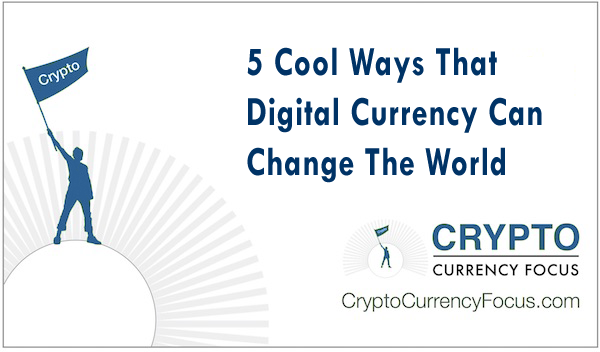Cool Ways That Digital Currency Can Change The World

The digital currency sector have attracted praise and scorn in almost equal measure. The reality is though that the idea of transferring funds electronically, instantaneously and without a middleman is revolutionary. It has the potential to transform business in ways that we wouldn’t even have dreamed of with the traditional currencies.
Here are five cool ways that digital currency can change the world.
-
Boost global transfers
Every year, immigrants send a total $500 billion to their mother countries. International transfer fees are approximately 10% for every $200 and this obviously reduces the amount they would have sent. Using digital currency can make it possible to send money across the world at no extra fee except for what is charged when converting the digital currency.
-
Alternative banking
The advent of mobile banking in Africa has proved the existence of an insatiable appetite for alternative banking. For instance, estimates from the World Economic Forum suggest that at least 60% of payments in Kenya are powered by mobile money. Interestingly, the charges for mobile money are usually pretty high. This means the users are more concerned with the convenience it offers. Using digital currency can totally transform this landscape by offering an inexpensive, secure and convenient alternative.
-
Ecommerce security
Internet privacy is a big concern from as far back as the 1980s. Over the years, it has become clear that internet security was a hard nut to crack due to the many third parties involved. Paying online with a credit card potentially exposes the user to phishing attacks because too much private information is required. Merchants have been forced to decline some international business for fear of fraud. This problem is solved by using digital currency, because users can pay anonymously.
-
Trusted payments
Making payments online comes with the risk of losing money. Nick Szabo even wrote a paper titled, “The God Protocol” whose premise is you need some level of trust to transact online. Escrow payments have been used as a way of ensuring buyer and seller satisfaction but these often rely on a third party. The third party usually helps in settling any disputes and this can easily be abused by one of the parties. Digital currency architecture can implement the multisig protocol, which only releases the funds after multiple people authenticate. This secures the transaction and also eliminates the need for a third party.
-
Smart contracts
Programmable money can come in handy in the execution of complex contracts. For instance, you can programme a payout to be triggered by a certain event. An example of a practical application is linking a computer program to a Bloomberg feed and then paying out funds to a given account depending on what happens to the stock price.
2017 is described as a year of cryptocurrencies due to the heightened interest in cryptocurrencies. A number of companies started allowing their customers to pay with a digital currency. As this trend continues over the coming years, the digital currency sector will continue to transform the entire business landscape.










